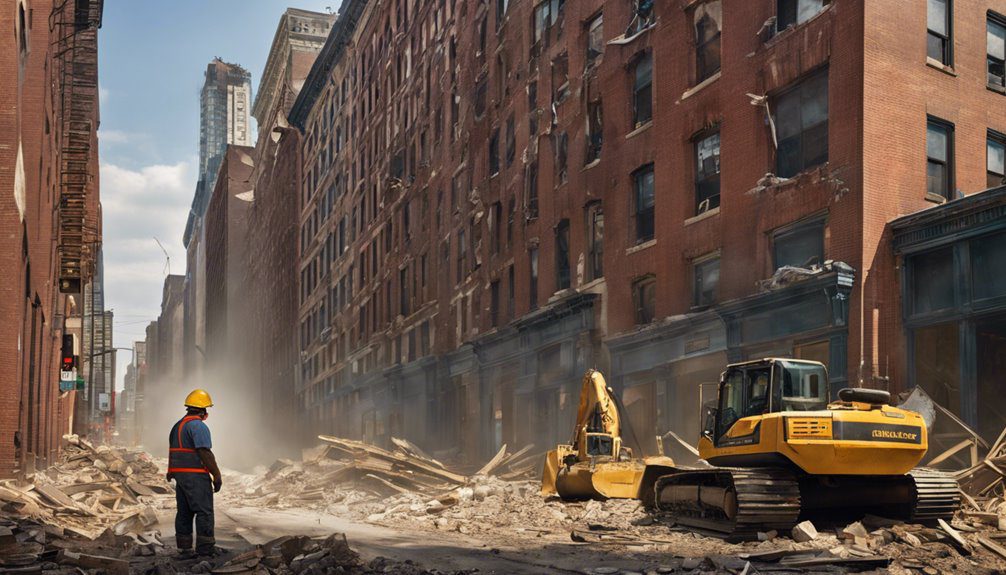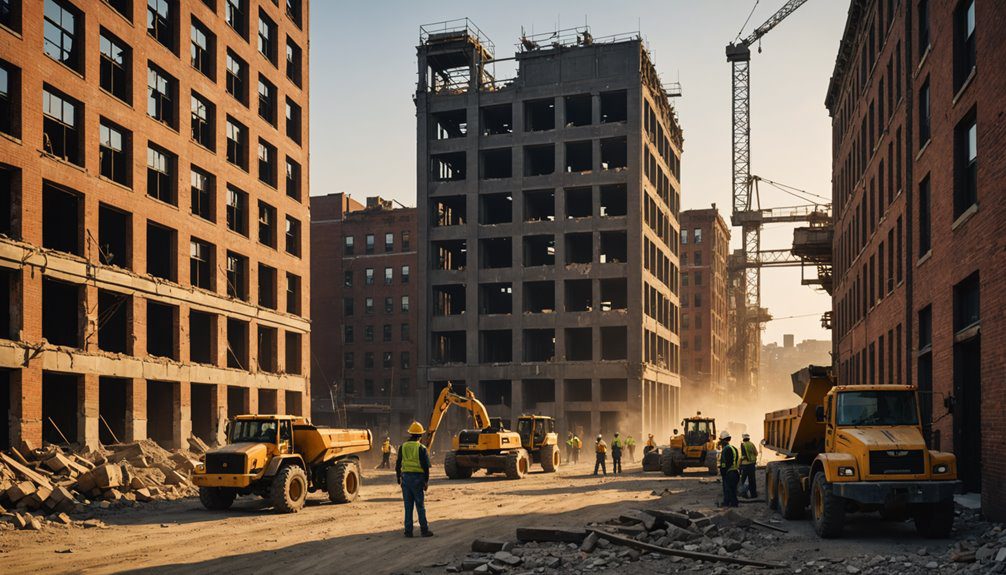If you're a demolition contractor in Philadelphia, understanding the Class B Bond is crucial for your operations. This bond not only safeguards your business but also assures property owners of your commitment to safety and compliance. You might be wondering how it sets you apart in a competitive market or what challenges you could face during the application process. As you navigate these complexities, it's essential to grasp the full implications of securing this bond—especially when it comes to maintaining credibility with your clients. What should you consider next?
Understanding Class B Bonds

When you're navigating the world of demolition contracting in Philadelphia, understanding Class B bonds is essential. These bonds serve as a form of insurance that protects clients and the public from potential financial losses due to a contractor's failure to fulfill their obligations. By obtaining a Class B bond, you're essentially showing that you're serious about your work and that you're financially responsible.
In Philadelphia, Class B bonds are specifically required for contractors handling demolition projects valued between $25,000 and $100,000. This requirement ensures that you have the financial backing to complete your projects as promised. If you don't meet your contractual obligations, the bond can cover any claims made against you, providing peace of mind to your clients.
Moreover, acquiring a Class B bond can enhance your credibility in the competitive demolition market. It signals to potential clients that you comply with local regulations and are committed to quality work. Additionally, having a performance bond can further improve your standing in the industry by providing assurance that projects will be completed as agreed.
Importance for Contractors
For contractors, understanding the importance of Class B bonds is crucial in establishing credibility and trust with clients. These bonds serve as a guarantee that you'll fulfill your contractual obligations, which reassures clients that their projects are in reliable hands.
When you possess a Class B bond, it reflects your commitment to professionalism and compliance with local regulations. Moreover, having a valid bond can set you apart from competitors who mightn't have this requirement covered. Clients are more likely to choose a contractor who demonstrates financial responsibility and integrity.
It's essential to remember that many property owners specifically look for bonded professionals when selecting a demolition contractor.
Additionally, a Class B bond can protect you from potential financial liabilities arising from accidents or damages during the demolition process. This safety net not only safeguards your business but also enhances your reputation in the industry. Furthermore, having a Class B bond signifies your adherence to local regulations that are essential for operating within your jurisdiction.
It shows that you're prepared for unforeseen circumstances, ensuring peace of mind for both you and your clients. In short, investing in a Class B bond is a smart move that can lead to more opportunities and long-term success in the competitive demolition market.
Benefits for Property Owners

Many property owners find that hiring a demolition contractor with a Class B bond brings significant peace of mind. This bond serves as a financial guarantee, ensuring that the contractor will complete the job according to local regulations and safety standards.
When you choose a bonded contractor, you're protecting your investment and reducing the risk of unexpected costs or legal issues.
Additionally, a Class B bond signifies that the contractor has undergone proper vetting and meets the necessary qualifications. This means you're likely to work with professionals who are knowledgeable and experienced in demolition work.
You can trust that they'll handle your project efficiently and safely.
Moreover, if any problems arise during the demolition process, the bond can provide recourse. Should the contractor fail to adhere to their obligations, you may be able to file a claim against the bond to recover losses. This added layer of security can be invaluable, especially for larger projects, as it ensures that the contractor fulfills their project obligations throughout the duration of the work.
Bonding Requirements in Philadelphia
Understanding the bonding requirements in Philadelphia is key for property owners looking to hire a demolition contractor. In Philadelphia, contractors must secure a Class B bond for demolition projects, which ensures financial protection for you and the city. This bond guarantees that the contractor will comply with local regulations and fulfill their obligations, minimizing the risk of financial loss in case of unprofessional conduct or project mishaps.
To obtain a Class B bond, the contractor typically needs to demonstrate their experience and financial stability. They may also be required to provide proof of insurance, which further protects you from potential liabilities that could arise during the demolition process. Additionally, ensuring that the contractor has an appropriate surety bond coverage can provide peace of mind regarding their financial responsibilities.
It's crucial to verify that the contractor holds a valid bond before signing any contracts. This bond not only serves as a safety net for you but also helps maintain industry standards.
The Application Process

Navigating the application process for a Class B bond in Philadelphia involves several key steps that contractors must follow to ensure compliance.
First, you'll need to gather the necessary documentation, which typically includes proof of your business registration, financial statements, and any relevant licenses. This paperwork is crucial, as it demonstrates your credibility and ability to fulfill contractual obligations.
Next, you'll want to reach out to a reliable bonding company. They'll guide you through the specifics of their application process, which may include completing a detailed application form and providing additional information about your business operations.
Be prepared for a credit check, as your financial history will play a significant role in determining your eligibility.
After submitting your application, the bonding company will review your information and may ask for clarification on certain points.
Once approved, you'll receive your Class B bond, which you must then file with the city as part of your demolition contractor requirements. In addition, understanding the importance of Contract Bonds can further enhance your ability to secure necessary funding for your projects.
Always double-check the filing deadlines and ensure you meet any ongoing obligations related to the bond to maintain compliance in Philadelphia.
Common Challenges Faced
While securing a Class B bond in Philadelphia can be a straightforward process, contractors often encounter several common challenges that can complicate their efforts. One major hurdle is understanding the specific requirements set by the city. Each municipality may have unique regulations, and navigating these can be overwhelming without proper guidance.
Additionally, financial constraints may arise. You might struggle to meet the required credit score or financial history, which can delay your bonding process. The costs associated with obtaining the bond can also be a deterrent, especially for small businesses or new contractors.
Another challenge lies in the documentation needed. You'll need to gather various forms of paperwork, including proof of insurance and business licenses, which can be time-consuming. Incomplete or inaccurate submissions often lead to delays, making it crucial to double-check everything before submission.
Lastly, the bonding company's underwriting process can be unpredictable. Different companies have varying criteria, and some might require additional information or collateral. This inconsistency can create confusion and frustration as you seek approval. Understanding surety bond requirements can help streamline this process and make it less daunting.
Ensuring Compliance and Safety

Securing a Class B bond isn't just about paperwork and financials; it also involves ensuring compliance with local regulations and maintaining safety standards on the job site.
As a demolition contractor, it's crucial to familiarize yourself with Philadelphia's specific codes and ordinances. This knowledge helps you avoid potential fines and legal issues down the road.
You'll need to develop a comprehensive safety plan that outlines procedures for various scenarios, including hazardous material handling and emergency response.
Training your team on these protocols is essential. Make sure everyone understands their role and knows how to operate equipment safely.
Regular inspections are key to maintaining compliance. Schedule frequent checks of your equipment and worksite to identify potential hazards before they become serious problems.
Documenting these inspections demonstrates your commitment to safety and can serve as important evidence if issues arise. Additionally, ensuring compliance with wage and welfare bond requirements is vital for protecting employee rights and maintaining a positive relationship with unions.
Conclusion
In conclusion, securing a Class B Bond in Philadelphia is crucial for demolition contractors like you. It not only demonstrates your commitment to safety and professionalism but also builds trust with property owners. By understanding the bonding requirements and navigating the application process, you can effectively position yourself in a competitive market. Embracing this responsibility sets you apart, ensuring you meet client expectations while safeguarding your business against potential liabilities.

